Unit 5 Topic 1 第一部分 听力
仁爱版英语9下册Unit5_topic1_同步检测试题(含听力材料和答案)
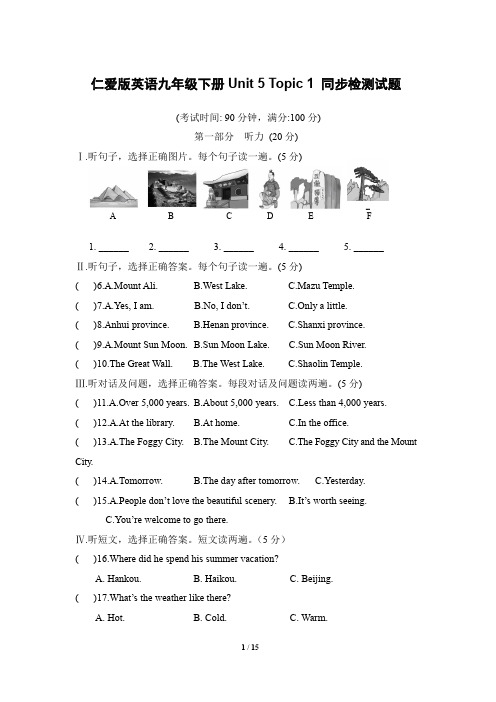
仁爱版英语九年级下册Unit 5 Topic 1 同步检测试题(考试时间: 90分钟,满分:100分)第一部分 听力 (20分)Ⅰ.听句子,选择正确图片。
每个句子读一遍。
(5分)1. ______2. ______3. ______4. ______5. ______ Ⅱ.听句子,选择正确答案。
每个句子读一遍。
(5分)( )6.A.Mount Ali. B.West Lake. C.Mazu Temple.( )7.A.Yes, I am. B.No, I don’t. C.Only a little.( )8.Anhui province. B.Henan province. C.Shanxi province.( )9.A.Mount Sun Moon. B.Sun Moon Lake. C.Sun Moon River.( )10.The Great Wall. B.The West Lake.C.Shaolin Temple. Ⅲ.听对话及问题,选择正确答案。
每段对话及问题读两遍。
(5分)( )11.A.Over 5,000 years. B.About 5,000 years. C.Less than 4,000 years.( )12.A.At the library. B.At home. C.In the office.( )13.A.The Foggy City. B.The Mount City.C.The Foggy City and the Mount City.( )14.A.Tomorrow. B.The day after tomorrow. C.Yesterday.( )15.A.People don’t love the beautiful scenery. B.It’s worth seeing.C.You’re welcome to go there.Ⅳ.听短文,选择正确答案。
九年级英语下册 Unit 5 China and the World Topic 1 China attracts millions of tourists from all over
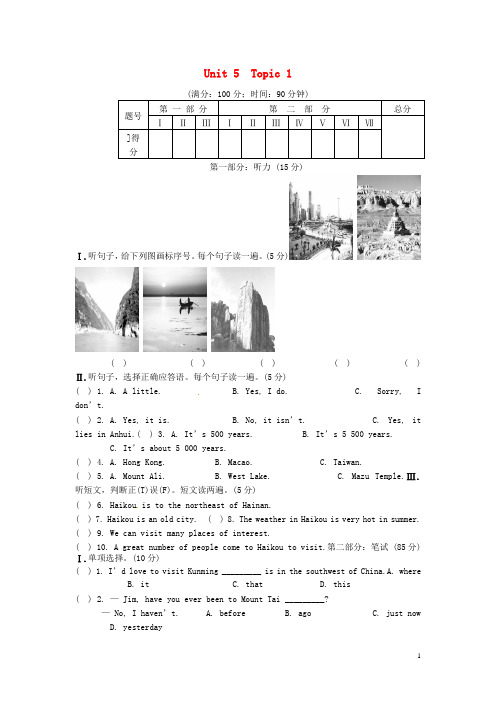
Unit 5 Topic 1题号第一部分第二部分总分ⅠⅡⅢⅠⅡⅢⅣⅤⅥⅦ]得分第一部分:听力 (15分)Ⅰ.听句子,给下列图画标序号。
每个句子读一遍。
(5分)( ) ( ) ( ) ( ) ( )Ⅱ.听句子,选择正确应答语。
每个句子读一遍。
(5分)( ) 1. A. A little. B. Yes, I do. C. Sorry, I don’t.( ) 2. A. Yes, it is. B. No, it isn’t. C. Yes, it lies in Anhui.( ) 3. A. It’s 500 years. B. It’s 5 500 years.C. It’s about 5 000 years.( ) 4. A. Hong Kong. B. Macao. C. Taiwan.( ) 5. A. Mount Ali. B. West Lake. C. Mazu Temple.Ⅲ.听短文,判断正(T)误(F)。
短文读两遍。
(5分)( ) 6. Haikou is to the northeast of Hainan.( ) 7. Haikou is an old city.( ) 8. The weather in Haikou is very hot in summer. ( ) 9. We can visit many places of interest.( ) 10. A great number of people come to Haikou to visit.第二部分:笔试 (85分) Ⅰ.单项选择。
(10分)( ) 1. I’d love to visit Kunming _________ is in the southwest of China.A. whereB. itC. thatD. this( ) 2. — Jim, have you ever been to Mount Tai _________?— No, I haven’t. A. before B. ago C. just nowD. yesterday( ) 3. Go downstairs and _________.A. fetch me the inkB. fetch the ink to meC.fetch the ink me D. fetched the ink for me( ) 4. Mount Song lies _________ Henan Province.A. toB. onC. fromD. in( ) 5. The surrounding areas of West Lake are the _________ of the famous Dragon Well Tea.A. houseB. familyC. homeD. place( ) 6. China is a big country _________ has a history of about 5, 000 years.A. thatB. whoC. in whichD. in that( ) 7. Luoyang _________ “the Home of Peonies(牡丹)”.A. is famous asB. is famous forC. is famousD. called( ) 8. We visited Jokhang Temple and Yangba Well, and also saw so many_________ people and some other places of _________.A. interested; interestedB. interested; interestC. interesting; interestedD. interesting; interest( ) 9. This place is well worth _________.A. visitB. to visitC. visitingD.visits( ) 10. There are a lot of places which _________ by visitors here. They are Shegutai, Wuliu, Huangcangyll and so on.A. must not missB. shouldn’t missC. shouldn’t be missedD.can’t missⅡ.情景交际。
人教版七年级英语下册第五单元测试题及听力原文带答案 Unit 5 Why do you like pandas

人教版七年级英语下册第五单元Unit 5 测试题第一部分听力理解(共15分)一、句子理解。
根据所听句子选择与所听内容相符的图示。
(共5分,每小题1分)( ) 1. A .B .C.( ) 2. A .B. C.( ) 3. A .B. C.( ) 4. A .B. C.( ) 5. A .B. C.二、对话理解。
听录音,选择正确答案。
(共4分,每小题1分)( ) 6. What’s the girl’s favorite animal?A. The giraffe.B. The panda.C. The penguin. ( ) 7. Why does the girl like penguins?A. They’re interesting.B. They’re beautiful.C. They’re cute.( ) 8. Where are giraffes from?A. Australia.B. France.C. Africa.( ) 9. What animals are cute?A. Koalas.B. Dolphins.C. A and B三、短文理解。
听两段录音,选择正确答案。
(共6分,每小题1分)(A)( ) 10. When does Bill sleep?A. In the day.B. At night.C. In the afternoon. ( ) 11. What does Bill eat?A. Grass.B. Leaves.C. Meat.( ) 12. What animal is Bill?A. B. C.( ) 13. Where is Larry from?A. China.B. Australia.C. Africa.( ) 14. How old is Larry?A. 8B. 20C. 10( ) 15. What animal is Larry?A .B .C.第二部分基础知识(共25分)四、单项填空。
七年级英语上册 Unit1Unit2听力资料练习题 仁爱版

Unit 1 Topic 1第一部分听力(20分)Ⅰ.听录音,选出你所听到的字母或单词。
每个读两遍。
(5分)( )1. A. CNN B. end C. F2F( )2. A. UK B. U.S.A. C. NBA( )3. A. morning B. afternoon C. China( )4. A. hi B. hello C. how( )5. A. nice B. fine C. myⅡ.听句子,选择正确图片。
每个句子读两遍。
(5分)6. ____7. ____8. ____9. ____ 10. ____Ⅲ.听录音,选择你所听到的句子。
每个句子读两遍。
(5分)( )11. A. Fine, thanks. B. I’m OK. C. I’m fine. ( )12. A. Good morning. B. Goodbye. C. Good afternoon. ( )13. A. This is my teacher. B. This is Maria. C. This is my mom. ( )14. A. Nice to meet you. B. How are you? C. How do you do? ( )15. A. See you later. B. See you. C. Let’s begin.Ⅳ.听句子,选择正确答语。
每个句子读两遍。
(5分)( )16. A. Fine, thanks. B. How do you do? C. You, too. ( )17. A. Good afternoon. B. Hello! C. Nice to see you, too. ( )18. A. Yes, I am. B. Thank you. C. I’m OK.( )19. A. Good morning, Mike. B. Thank you. C. Goodbye, Mike. ( )20. A. Yes, I am. B. Thank you. C. Fine, thanks.Unit 1 Topic 2第一部分听力(20分)Ⅰ.听单词,选择你所听到的单词。
仁爱英语九年级听力UNIT1
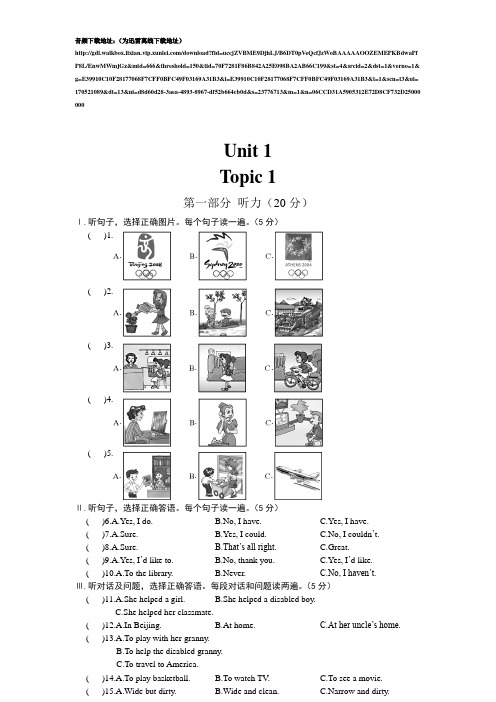
音频下载地址:(为迅雷离线下载地址)/download?fid=uccjZVBME9DjhLJ/B6DT0pVeQcfJzWoBAAAAAOOZEMEPKBdwaPf P8L/EnwMWmjGz&mid=666&threshold=150&tid=70F7281F86B842A25E098BA2AB66C199&st=4&srcid=2&dst=1&verno=1& g=E39910C10F28177068F7CFF0BFC49F03169A31B3&i=E39910C10F28177068F7CFF0BFC49F03169A31B3&t=1&scn=t3&ui= 170521089&dt=13&ni=d8d60d28-3aea-4893-8967-df52b664cb0d&s=23776713&m=1&n=06CCD31A5905312E72D8CF732D25000 000Unit 1Topic 1第一部分听力(20分)Ⅰ.听句子,选择正确图片。
每个句子读一遍。
(5分)( )1.. . .( )2.. . .( )3.. . .( )4.. . .( )5.. . .Ⅱ.听句子,选择正确答语。
每个句子读一遍。
(5分)( )6.A.Yes, I do. B.No, I have. C.Yes, I have.( )7.A.Sure. B.Yes, I could. C.No, I couldn’t.( )8.A.Sure. B.That’s all right. C.Great.( )9.A.Yes, I’d like to. B.No, thank you. C.Yes, I’d like.( )10.A.To the library. B.Never. C.No, I haven’t.Ⅲ.听对话及问题,选择正确答语。
新生代英语基础教程1第二版unit5听力答案

新生代英语基础教程1第二版unit5听力答案一.Teil 1 Linda fragt Fabio. Hör das Gespräch. Welche Antwort ist richtig?(共10小题,每小题 1.5分,共15分)1.Wie alt bist du? [单选题] *a)13 Jahre.b)14 Jahre.(正确答案)2. Lernst du Englisch? [单选题] *a) Ja, Englisch ist toll.(正确答案)b)Nein, ich lerne Deutsch.3. Ist das dein Handy? [单选题] *a) Ja.b) Nein.(正确答案)4. Wie ist deine Telefonnummer? [单选题] *a) 0155 - 53 52 51.(正确答案)b) 0155 - 51 52 535. Magst du Musik? [单选题] *a) Ja, ich mag Pop.b) Ja, ich mag Hiphop.(正确答案)6. Kennst du Casper? [单选题] *a) Ja.b) Nein.(正确答案)Teil2 Was ist das? Hör die Gespräche.7Frau Milan kommt aus [单选题] *a) Münchenb)Stuttgart(正确答案)8.Sie ist [单选题] *a) verheiratetb)nicht verheiratet(正确答案)9.Sie hat a) ein Kind b) zwei Kinder [单选题] *a) ein Kind(正确答案)b) zwei Kinder10.Frau Milan kann [单选题] *1a) kochen2b) nicht kochen(正确答案)Teil 3 Hör das Gespräch und beantworte die Frage (共10小题,每小题1.5分,共15分)11. Was macht Tina gerade? [单选题] *a) Hausaufgabeb) Klavier üben(正确答案)c) Englisch lernen12.Tina hat Zeit um... [单选题] *a) 16:30.b) 17:30.(正确答案)c) 18:30.13.Marc möchte gern... [单选题] *a) Tennis spielen(正确答案)b) Fahrrad fahrenc) Fußball spielen14.Marc....[单选题] *a) fährt mit dem Fahrrad.b) holt Tina ab.c) trifft Tina am Schwimmbad(正确答案)Du hörst zwei Gespräche. Kreuze richtig(a) oder falsch(b).Gespräch 115.Sarah kocht heute Suppe. [单选题]R(正确答案)F16.Sarah braucht noch Gemüse. [单选题]RF(正确答案)17.Ihr Papa kauft auf dem Markt ein. [单选题] *RF(正确答案)18.Frau Huber isst heute im Restaurant. [单选题] RF(正确答案)19.Der Vater von Tom hat Geburtstag. [单选题]R(正确答案)F20.Andrej muss morgen nicht zur Schule. [单选题] R(正确答案)F。
全新版大学进阶英语视听说教程第1册--Unit5听力文本
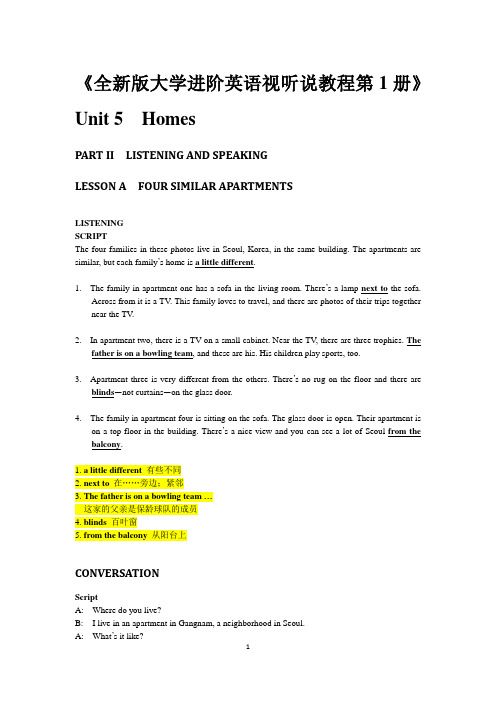
《全新版大学进阶英语视听说教程第1册》Unit 5 HomesPART II LISTENING AND SPEAKINGLESSON A FOUR SIMILAR APARTMENTSLISTENINGSCRIPTThe four families in these photos live in Seoul, Korea, in the same building. The apartments are similar, but each family’s home is a little different.1. The family in apartment one has a sofa in the living room. There’s a lamp next to the sofa.Across from it is a TV. This family loves to travel, and there are photos of their trips together near the TV.2. In apartment two, there is a TV on a small cabinet. Near the TV, there are three trophies. Thefather is on a bowling team, and these are his. His children play sports, too.3. Apartment three is very different from the others. There’s no rug on the floor and there areblinds—not curtains—on the glass door.4. The family in apartment four is sitting on the sofa. The glass door is open. Their apartment ison a top floor in the building. There’s a nice view and you can see a lot of Seoul from the balcony.1. a little different有些不同2. next to在……旁边;紧邻3. The father is on a bowling team …这家的父亲是保龄球队的成员4. blinds百叶窗5. from the balcony从阳台上CONVERSATIONScriptA: Where do you live?B: I live in an apartment in Gangnam, a neighborhood in Seoul.A: What’s it like?B: It has a large living room, two bedrooms, a kitchen, and a bathroom.A: Sounds like a nice place.B: Yeah, it is, but it’s a long way from my school.LESSON B Living SmallListening 1ScriptLiving SmallToday, 50 percent of the people on Earth live in cities. By 2030, it will be 60 percent. With more people in cities, there is less space, and housing costs more. What can we do? Here’s an idea.Container HousingThe city of Amsterdam is using old shipping containers as housing for students and other people. The containers are small—30 square meters (three hundred twenty square feet)—but they are comfortable. There is space for a living area, bedroom, kitchen, and bathroom. These houses are also inexpensive: only a few thousand dollars to buy. Today, the containers are used around the world as homes and student dormitories, as well as shops, offices, and hotels.Tiny HousesIn the U.S., Jay Shafer makes tiny houses for people. The smallest is only 9 square meters (98 square feet). The houses are small, but they have everything you need. On the first floor, there is a kitchen, a living area, and a bathroom. On the second floor is a bedroom. It is big enough for two people. The houses are also inexpensive. Most are $15,000.1. Container Housing集装箱房屋2. Tiny Houses微型房屋Listening 2ScriptM1: I go to school in Amsterdam and I need some place to live. Container homes are comfortable and inexpensive. They’re perfect for students.F1: I don’t know ... I know container apartments are a good idea, but I think they’re ugly. They look like big boxes.M2: A tiny house is perfect for one or two people, but I have a family of four. They’re just too small.F2: Tiny houses are inexpensive to make and buy so you save money. Also, they’re small so you use less water and energy. They’re good for people and the Earth.1.some place to live一个住的地方2. a family of four一家四口人3.save money省钱LISTENING SKILLSScript1) Laura is one of the top students in Grade One.2) Ted likes to sing English pop songs.3) Listening is not a big problem for me.4) Frank can speak six languages fluently.5) I’d like to read novels and short stories in English.6) Bob’s strong local accent makes it difficult for us to understand him.1. one of the top students优秀学生之一2. local accent当地口音PART III VIDEO ECO-FRIENDLY HOMESCRIPTNarrator:This is the Cohen’s home. It’s a three-bedroom house in a suburb in the United States. It’s a nice area, but there is a problem with this house: it uses a lot of energy.But this isn’t surprising. Houses and buildings use forty percent of all the energy in the United States. And many homes waste a lot of energy.Amory Lovins teaches people to save energy in their homes.Today, he is visiting the Cohen’s house. Lovins walks around the house, and he finds different problems. There’s a problem with the heater in one room, and the freezer in the kitchen. Lovins:“Oh, what have we here...?”Narrator:We don’t have to use a lot of electricity in our homes, says Lovins. There are simple ways to save energy.It’s surprising; homes waste a lot of energy, even while you sleep.To save energy in your home, unplug electronics when you’re not using them.Lovins:“Do you see that little red light down in the corner?”Narrator:Now, the TV is off, but it’s still using energy because it’s plugged in. The Cohens pay sixty dollars every year for this extra energy. The Cohen family has lots of electronics. They’re all plugged in. So they’re always using energy.Lovins lives in Aspen, Colorado, in the mountains. His house is very eco-friendly. All of the home’s electricity comes from solar panels.Some days, it’s below -40 degrees Celsius here. But Lovins’ house is warm, thanks to the solar panels.In fact, Lovins’whole house uses very little energy—only 120 watts. That’s a little more energy than you need to turn on one light bulb.It’s a very eco-friendly home.1. a three-bedroom house一幢有三间卧室的房子2.unplug electronics拔出电器的电源插头3.plug in插上电源的插头4.thanks to幸亏;由于。
高中英语:2020人教(新教材)新素养导学必修一 五 Unit 1 Discovering Useful Structures Word含答案
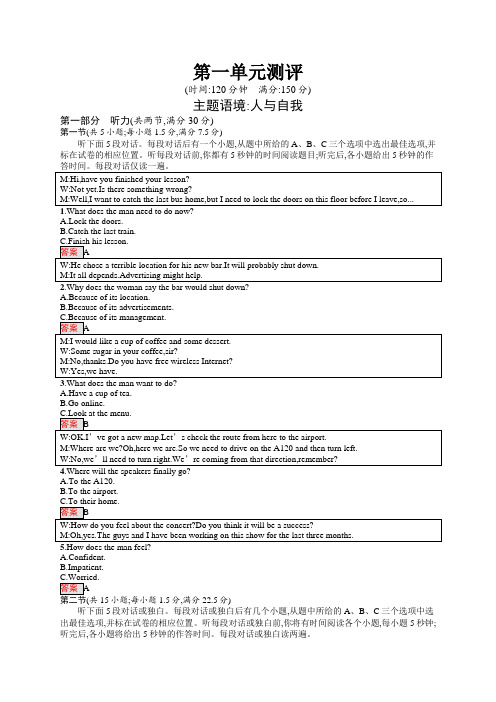
第一单元测评(时间:120分钟满分:150分)主题语境:人与自我第一部分听力(共两节,满分30分)第一节(共5小题;每小题1.5分,满分7.5分)听下面5段对话。
每段对话后有一个小题,从题中所给的A、B、C三个选项中选出最佳选项,并标在试卷的相应位置。
听每段对话前,你都有5秒钟的时间阅读题目;听完后,各小题给出5秒钟的作A.Lock the doors.B.Catch the last train.A.Because of its location.B.Because of its advertisements.A.Have a cup of tea.B.Go online.A.To the A120.B.To the airport.A.Confident.B.Impatient.(共15小题;每小题1.5分,满分22.5分)听下面5段对话或独白。
每段对话或独白后有几个小题,从题中所给的A、B、C三个选项中选出最佳选项,并标在试卷的相应位置。
听每段对话或独白前,你将有时间阅读各个小题,每小题5秒钟;听完后,各小题将给出5秒钟的作答时间。
每段对话或独白读两遍。
听第6段材料,回答第6、7题。
A.Play a game.B.Watch a match.A.China will lose.B.Russia will lose.听第7段材料,回答第8至10题。
A.At the cleaner’s.B.In a restaurant.A.On Saturday evening.B.One week later.A.Satisfied.B.Angry.听第8段材料,回答第11至13题。
A.He’ll have good conversations with others.B.He’ll be limited by what he has prepared.ll become even more nervous.’s the man’s concern?A.He can’t understand people’s questions.B.He has nothing to say.A.Patient.B.Strict.听第9段材料,回答第14至16题。
仁爱版英语九年级下册:Unit 5 Topic 1. China attracts millions
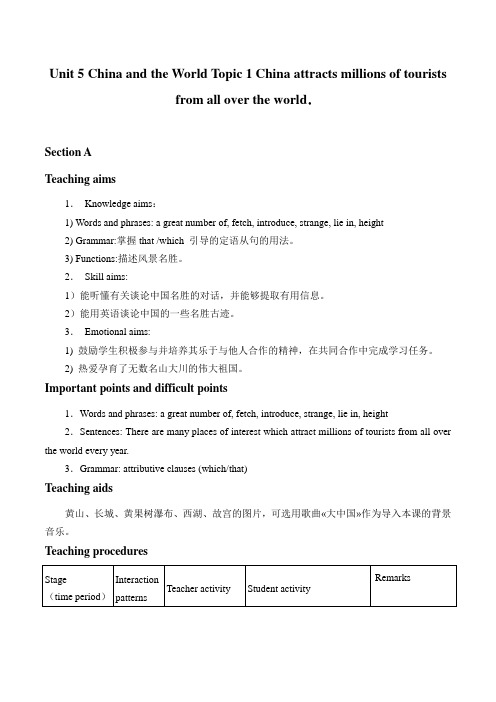
Unit 5 China and the World Topic 1 China attracts millions of touristsfrom all over the world.Section ATeaching aims1.Knowledge aims:1) Words and phrases: a great number of, fetch, introduce, strange, lie in, height2) Grammar:掌握that /which 引导的定语从句的用法。
3) Functions:描述风景名胜。
2.Skill aims:1)能听懂有关谈论中国名胜的对话,并能够提取有用信息。
2)能用英语谈论中国的一些名胜古迹。
3.Emotional aims:1) 鼓励学生积极参与并培养其乐于与他人合作的精神,在共同合作中完成学习任务。
2) 热爱孕育了无数名山大川的伟大祖国。
Important points and difficult points1.Words and phrases: a great number of, fetch, introduce, strange, lie in, height2.Sentences: There are many places of interest which attract millions of tourists from all over the world every year.3.Grammar: attributive clauses (which/that)Teaching aids黄山、长城、黄果树瀑布、西湖、故宫的图片,可选用歌曲«大中国»作为导入本课的背景音乐。
Teaching proceduresBlackboard designSection BTeaching aims1.Knowledge aims:1) Words and phrases: stone, guard, It’s said that…, a symbol of, play an important part in …2) Grammar:进一步掌握that /which 引导的定语从句的用法。
全新版《大学英语听说教程》第一册Unit 5听力原文、答案及综合教程练习答案
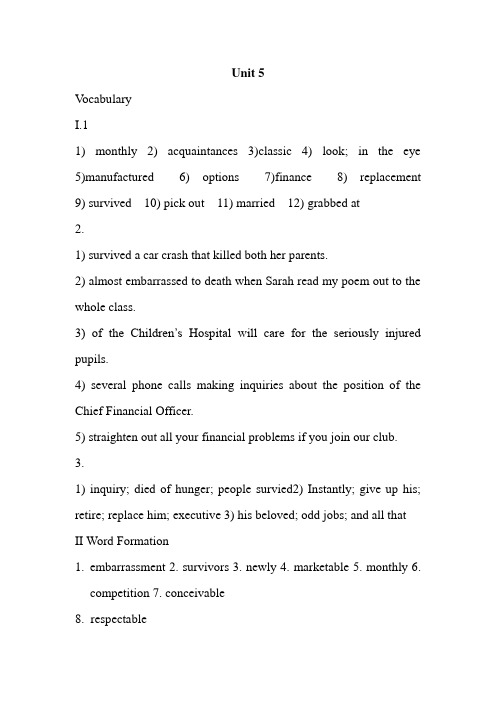
Unit 5V ocabularyI.11) monthly 2) acquaintances 3)classic 4) look; in the eye 5)manufactured 6) options 7)finance 8) replacement 9) survived 10) pick out 11) married 12) grabbed at2.1) survived a car crash that killed both her parents.2) almost embarrassed to death when Sarah read my poem out to the whole class.3) of the Children’s Hospital will care for the seriously injured pupils.4) several phone calls making inquiries about the position of the Chief Financial Officer.5) straighten out all your financial problems if you join our club. 3.1) inquiry; died of hunger; people survied2) Instantly; give up his; retire; replace him; executive 3) his beloved; odd jobs; and all thatII Word Formation1.embarrassment2. survivors3. newly4. marketable5. monthly6.competition 7. conceivable8.respectableIII. Usage1.the poor2. The deceased/The dead3. the disabled4. the French5.The accused 6. the young 7. the unemployed 8. the latter…the former…Comprehensive ExercisesI.Cloze1.Text-related1)died of 2) instantly 3) classic 4)ask around 5) surviving 6) retire 7)executive 8) replacement 9)stock 10) look…in the eye 2.Theme-related1)impressed 2) diligence 3) Instead 4) Contrary 5) professionally 6) perform 7) personal 8) balance 9) commitment 10) revealed II. Translation1.1) I’m not sure where you can find a good carpenter---you’d better ask around.2) Feeling a little embarrassed, he quickly cleared his throat and looked up at the painting on the wall.3) Michael was survived by three sons, two daughters, and his wife Elizabeth.4) As a financial expert, William advised us to invest our money in the stock market.5) We small retailers can’t compete with supermarkets in pricing and sales.2.My dad is a hard-working executive of a manufacturing firm. He works six days a week. Every day he has to straighten out various kinds of problems so that he often stays up late/nights. However, he tries his best to balance/maintain balance between work and family. On Sundays my dad usually stays at home and cares for us as much as he can. To my greatest joy, he cooks our favorite dished and plays ball with us.Unit 5Part A1. Call back David Johnson this afternoon.2. Call Bill Green at 415-389-1074 this evening. It’s important.3. Meet Judy outside the Art Museum at ten tomorrow morning.4. Don’t forget to go to Tom’s party this evening.1. 6247-22552. 6417-28173. 612-930-9608Part BTapescriptA Business CallA: Good afternoon. ABC Imports. May I help you?B: Yes, may I speak to Mr. James Johnson, please?A: I’m afraid Mr. Johnson isn’t available right now. Would you like to leave a message?B: This is Richard Alexander with Star Electronics. It’s very important that he returns my call this afternoon.A: Does he have your office number and your mobile phone number?B: I thinks so, but let me give them to you again.A: Okay.B: My office number is 714-555-2000; my cell phone number is 909-555-2308. He can reach me at my office number before 6 p.m. or anytime today on my mobile.A: Very well, I’ll give him your message as soon as he returns to the office.Exercise 1: b aExercise 2: 1) James Johnson 2) ABC Imports 3) Richard Alexander 4) Star Electronics5) 909-555-2308 6) 714-555-2000 7) Call Richard Alexander 8) 6 p.m.Dialogue 1: 1) Frank Qian’s 2) Frank 3) Well 4) I’m afraid Mr. Qian’s not in the office at the moment 5) try his mobile 6) give me the number 7) 909-365-2781 8) Just let me check that. 9)909-365-2781 10)That’s it.Dialogue 2: 1) Can I help you? 2) I’d like to 3) Mr. Paul Osman 4) I’m afraid Mr. Osman is at a meeting right now. 5)Can I take a message 6) Brian Gray 7) “The Bike Shop”8) urgent 9) Mr. Osman 10) Mr. Gray 11) my phone number 12) I’ll give your message to Mr. Osman as soon as possiblePart CTapescript Good Luck CompanySecretary: Good Luck Company.Applicant: I’m calling in connection with your post of computer sales representative. Your advertisement said that I should ring up first for an interview.Secretary: That’s right. What are your qualifications?Applicant: I have a degree in Computer Science.Secretary: Do you have any relevant working experience?Applicant: Yes, I have been a computer programmer in a trading company for three years.Secretary: Can I have your name, please?Applicant: Brian Tong.Secretary: Okay, I’ve written down your information and I’ll pass this on to our personnel department for further consideration before we decide whether there will be an interview with you.Applicant: When would you let me know the result?Secretary: In about 2 weeks’ time, I think. How can I contact you, Mr Tong?Applicant: You can call me at my office at 38839673 during office hours.Secretary: 3-8-8-3-9-6-7-3. Okay, I’ll let you know the result when I hear from the personnel department.Exercise: 3. (Post) Computer sales representative 4. A degree in Computer Science5. A computer programmer in a trading company for three years6. 38839673。
外研社最高一英语新教材必修一Unit 1单词表和听力
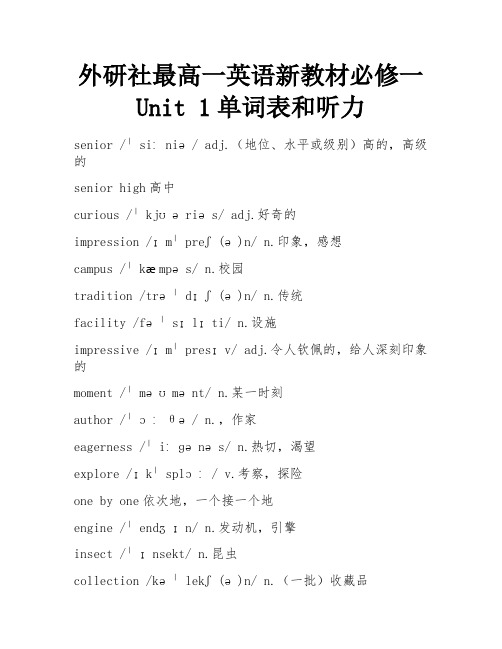
外研社最高一英语新教材必修一Unit 1单词表和听力senior /ˈsiːniə/ adj.(地位、水平或级别)高的,高级的senior high高中curious /ˈkjʊəriəs/ adj.好奇的impression /ɪmˈpreʃ(ə)n/ n.印象,感想campus /ˈkæmpəs/ n.校园tradition /trəˈdɪʃ(ə)n/ n.传统facility /fəˈsɪlɪti/ n.设施impressive /ɪmˈpresɪv/ adj.令人钦佩的,给人深刻印象的moment /ˈməʊmənt/ n.某一时刻author /ˈɔːθə/ n.,作家eagerness /ˈiːɡənəs/ n.热切,渴望explore /ɪkˈsplɔː/ v.考察,探险one by one依次地,一个接一个地engine /ˈendʒɪn/ n.发动机,引擎insect /ˈɪnsekt/ n.昆虫collection /kəˈlekʃ(ə)n/ n.(一批)收藏品organise /ˈɔːɡənaɪz/ v.组织nudge /nʌdʒ/ n.(通常用肘)轻推butterfly /ˈbʌtəflaɪ/ n.蝴蝶butterflies in oneˈs stomach情绪紧张,心里发慌breathe /briːð/ v.呼吸panic /ˈpænɪk/ n.惊恐,惊慌in panic惊慌地challenge /ˈtʃæləndʒ/ n.挑战pressure /ˈpreʃə/ n.压力calm /kɑːm/ adj.镇静的,沉着的description /dɪˈskrɪpʃ(ə)n/ n.描述,描写,叙述,形容confident /ˈkɒnfɪdənt/ adj.有信心的,自信的poster /ˈpəʊstə/ n.海报badminton /ˈbædmɪntən/ n.羽毛球drama /ˈdrɑːmə/ n.戏剧band /bænd/ n.乐队,乐团debate /dɪˈbeɪt/ n.讨论,辩论gym /dʒɪm/ n.体育馆,健身房piano /piˈænəʊ/ n.钢琴stage /steɪdʒ/ n.舞台photography /fəˈtɒɡrəfi/ n.摄影inner /ˈɪnə/ adj.(想法或情感)未表达出来的,隐藏的,内心的pm /ˌpiːˈem/ 下午argue /ˈɑːɡjuː/ v.争论,争辩topic /ˈtɒpɪk/ n.话题,论题sharp /ʃɑːp/ adj.敏锐的,聪明的dinosaur /ˈdaɪnəsɔː/ n.恐龙dolphin /ˈdɒlfɪn/ n.海豚intelligent /ɪnˈtelɪdʒ(ə)nt/ adj.有智慧的,聪明的investigate /ɪnˈvestɪɡeɪt/ adj.查明,调查various /ˈveəriəs/ adj.各种各样的,各种不同的volunteer /ˌvɒlənˈtɪə/ n.志愿者,义务工,自愿参加者gain /ɡeɪn/ v.获得,赢得apply /əˈplaɪ/ v.申请schedule /ˈʃedjuːl/ n.计划表,进度表,日程表award /əˈwɔːd/ n.奖,奖赏opportunity /ˌɒpəˈtjuːnɪti/ n.机会,时机hint /hɪnt/ n.有益的建议subscribe /səbˈskraɪb/ v.订阅(报纸或杂志)view /vjuː/ n.(一次)观看former /ˈfɔːmə/ adj.从前的graduate /ˈɡrædʒueɪt/ v.毕业orientation /ˌɔːriənˈteɪʃ(ə)n/ n.(新工作或学习课程开始前一段时间的)培训,迎新Orientation Day迎新日frightened /ˈfraɪtnd/ adj.受惊的,害怕的sight /saɪt/ n.看到,看见figure /ˈfɪɡə/ v.认为,以为go all out全力以赴,竭尽全力select /səˈlekt/ v.挑选,选择particular /pəˈtɪkjʊlə/ adj.特定的,特指的in particular尤其,特别rainbow /ˈreɪnbəʊ/ n.彩虹neat /niːt/ adj.好的,令人愉快的specific /spəˈsɪfɪk/ adj.具体的,特定的refer /rɪˈfɜː/ v.提到,谈到refer to提到,谈到journal /ˈdʒɜːnl/ n.日记,日志junior /ˈdʒuːniə/ adj.低年级的struggle /ˈstrʌɡ(ə)l/ v.奋斗,拼搏memorise /ˈmeməraɪz/ v.记住,熟记skateboarding /ˈskeɪtbɔːdɪŋ/ n.滑板运动forward /ˈfɔːwəd/ adv.向前look forward to(兴奋地)期待,盼望mittee /kəˈmɪti/ n.委员会improve /ɪmˈpruːv/ v.改善,改进rate /reɪt/ v.对……作评估,评价performance /pəˈfɔːməns/ n.(工作或活动中的)表现exchange /ɪksˈtʃeɪndʒ/ v.意见、信息等交流为什么孩子在家里活泼外向,在外人面前总是胆小内向?为什么孩子经常觉得自己词穷,写不出好的英语作文?为什么孩子看问题总是带着偏见和片面?这些与儿童内在视听觉三个方面的内在感官失衡有很大关系。
必修一unit5听力材料

必修一unit5听力材料必修一Unit 5 听力材料在必修一的Unit 5中,我们学习了关于音乐的话题。
音乐是人类文化的重要组成部分,它能够给人们带来欢乐、激励和安慰。
在这个单元的听力材料中,我们将听到一些关于音乐的对话和讨论,让我们一起来听一听吧。
第一段对话是关于音乐喜好的。
两个人在谈论他们最喜欢的音乐类型。
第一个人喜欢流行音乐,因为它旋律动听,歌词易懂。
第二个人则喜欢古典音乐,因为它有深度和内涵。
他们互相分享了一些他们最喜欢的歌手和乐曲,展示了他们对音乐的热爱和了解。
第二段对话是关于音乐对人们情绪的影响。
一个人说,当他感到沮丧或者压力很大的时候,他会听一些轻快的音乐来让自己放松和愉快起来。
另一个人则表示,当他感到兴奋或者激动的时候,他会选择一些节奏强烈的音乐来增加他的能量和动力。
他们都认为音乐是一种情绪的调节器,能够帮助人们更好地面对生活中的各种情绪。
第三段对话是关于音乐教育的重要性。
一个人说,他小时候学习了钢琴,这让他对音乐产生了浓厚的兴趣。
他认为音乐教育能够培养孩子们的音乐才能和审美能力,同时也能够提高他们的学习能力和创造力。
另一个人则表示,他没有接受过音乐教育,但他仍然喜欢音乐并且会自己学习弹吉他。
他认为音乐是一种自我表达的方式,不一定需要正式的教育。
通过这些对话,我们可以看到音乐在人们生活中的重要性。
它不仅仅是一种娱乐方式,更是一种情感的表达和沟通方式。
无论是喜欢流行音乐还是古典音乐,无论是通过正式的音乐教育还是自学,音乐都能够给人们带来快乐和启发。
在学习这个单元的过程中,我们还可以通过听音乐来提高我们的听力能力。
我们可以选择一些我们喜欢的歌曲,仔细听歌词,尝试理解其中的意思。
我们也可以尝试听一些不同类型的音乐,拓宽我们的音乐视野。
通过这样的方式,我们不仅能够提高我们的听力技巧,还能够享受音乐带来的愉悦和享受。
总之,音乐是我们生活中不可或缺的一部分。
它能够给我们带来欢乐、激励和安慰。
冀教版九年级上册英语五单元点拨训练单元测试卷答案
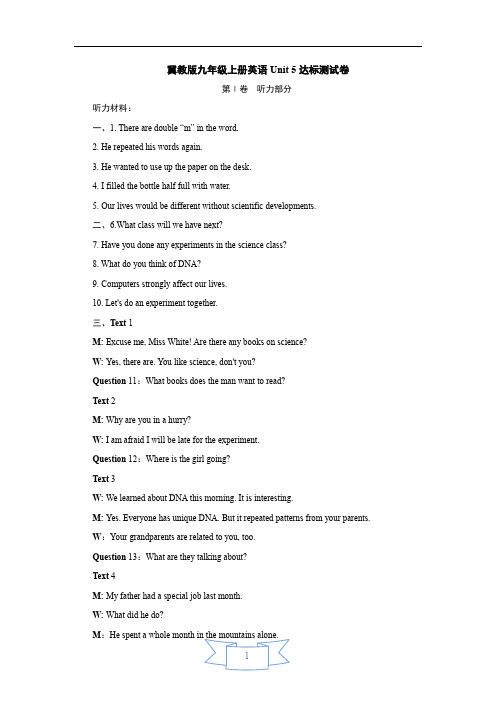
冀教版九年级上册英语Unit 5达标测试卷第Ⅰ卷听力部分听力材料:一、1. There are double “m” in the word.2. He repeated his words again.3. He wanted to use up the paper on the desk.4. I filled the bottle half full with water.5. Our lives would be different without scientific developments.二、6.What class will we have next?7. Have you done any experiments in the science class?8. What do you think of DNA?9. Computers strongly affect our lives.10. Let's do an experiment together.三、Text 1M: Excuse me, Miss White! Are there any books on science?W: Yes, there are. You like science, don't you?Question 11:What books does the man want to read?Text 2M: Why are you in a hurry?W: I am afraid I will be late for the experiment.Question 12:Where is the girl going?Text 3W: We learned about DNA this morning. It is interesting.M: Yes. Everyone has unique DNA. But it repeated patterns from your parents. W:Your grandparents are related to you, too.Question 13:What are they talking about?Text 4M: My father had a special job last month.W: What did he do?M:W: What did he do in the mountains?M: He studied butterflies. He looked for food and water all by himself. And, he built his house himself, too.Question 14: What did the boy's father do last month?Question 15: How did the boy's father get his food and water?Text 5W: Excuse me. I want to go to the National Palace Museum. Which bus should I take?M: Bus No. 15. I think it will come soon. Why do you want to go to the National Palace Museum?W: My son lives near the museum, and I'm going to visit him.M: Oh, your bus is coming!W: It's really nice talking to you. Thanks again. Bye!M: You're welcome. Bye!Question 16: Which bus should the woman take?Question 17: What is the woman going to do?Question 18: Where are the speakers?四、Text 1Mike's father is a scientist. He is going to Washington on December 20 th by plane. He will have an important meeting there. After the meeting he will spend some time visiting the While House and other places of interest in Washington. After that he will come back on December 27th.Question 19: What is Mike's father?Question 20: How will Mike's father go to Washington?Question 21: How long will Mike's father stay in Washington?Text 2Dear Tommy,I will go to the Science Museum with my friends this Sunday. We will start at 8:00 a.m. It will take us about 2 hours to get to the centre of the town by subway, and from there we have to catch a bus. It will take us another hour to get to the museum. We will spend about an:30 boat to the HappyLake for swimming. Would you like to go with us? Please write to me!Yours,Ann Question 22: Where will Ann go this Sunday morning?Question 23: When will they get to the museum?Question 24: How long will they stay in the museum?Question 25: How will they go to the Happy Lake?五、Dick studied DNA in his science classes this week. He's very interested in this topic. So he borrowed two books about DNA from the school library this Friday. The first book is called The Discovery of DNA. It will help Dick understand the secret of life in an easy and interesting way. Dick loves this book very much and wants to have a book like this. This book only costs two dollars and fifteen cents. So he's going to buy one in the bookstore near his school next week. The second book is called The Ideas of Biology. It introduces not only DNA but also the future of cloning. It is really a “heavy” book. Dick doesn't think he can finish reading it in several days.听力答案:一、1-5:BCACA二、6-10:ABAAA三、11-15:ACCCC16-18:BCB四、19-21:CBA 22-25:ABBC五、26.Friday27. first28. two dollars29. bookstore30. heavy第Ⅱ卷笔试部分六、31.B32.C点拨:be worth doing sth.值得做某事,故选C。
仁爱英语七年级下册单元同步测试题Unit 5 Topic 1(含答案)
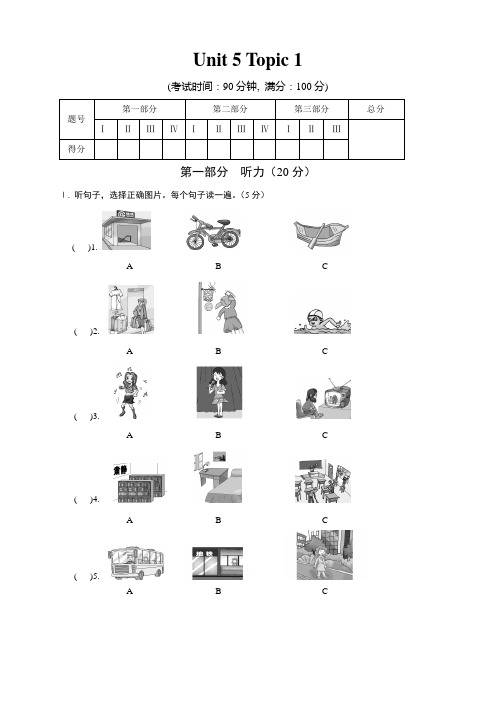
Unit 5 Topic 1(考试时间:90分钟, 满分:100分)第一部分第二部分第三部分总分题号ⅠⅡⅢⅣⅠⅡⅢⅣⅠⅡⅢ得分第一部分听力(20分)Ⅰ. 听句子,选择正确图片。
每个句子读一遍。
(5分)( )1.A B C( )2.A B C( )3.A B C( )4.A B C( )5.A B CⅡ. 听句子,选择正确答语。
每个句子读一遍。
(5分)( )6. A. Oh, I’m not happy. B. The same to you. C. We are all happy.( )7. A. I have no free time. B. How about you?C. I often play basketball.( )8. A. No, I don’t. B. Yes, he does.C. No, I walk to school.( )9. A. Yes, it is. B. You’re right. C. Thank you.( )10. A. I like playing it very much. B. I want to play it very much.C. Three times a week.Ⅲ. 听对话,选择正确答案。
每段对话读两遍。
(5分)( )11. How does Michael usually come to school?A. By bus.B. By bike.C. On foot.( )12. What does the man often do on Sundays?A. He plays computer games.B. He plays basketball.C. He plays football.( )13. How often does Yu Ming go to the zoo?A. Every month.B. Every day.C. Every week.( )14. How does Miss Wang sometimes come to school?A. By bike.B. By bus.C. On foot.( )15. Where does Zhou Lina usually have lunch?A. In her office.B. At home.C. At school.Ⅳ. 听短文,完成下列表格。
七年级上册仁爱英语听力答案合集
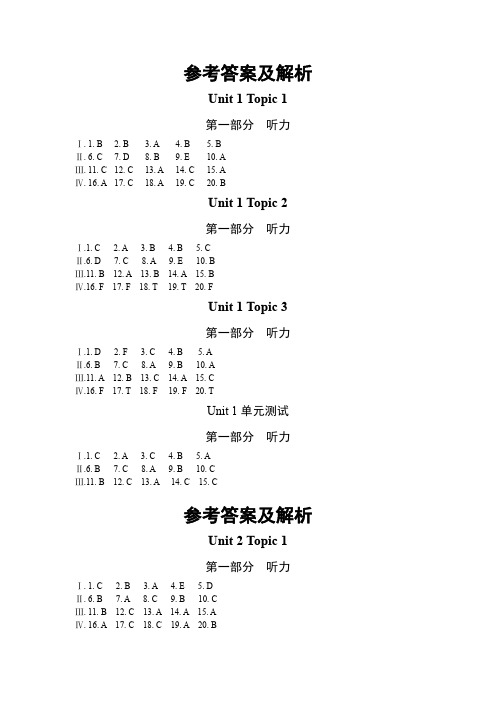
Unit 1 Topic 1第一部分听力Ⅰ. 1. B 2. B 3. A 4. B 5. BⅡ. 6. C7. D8. B9. E10. AⅢ. 11. C12. C13. A14. C15. AⅣ. 16. A17. C18. A19. C20. BUnit 1 Topic 2第一部分听力Ⅰ.1. C 2. A 3. B 4. B 5. CⅡ.6. D 7. C 8. A 9. E 10. BⅢ.11. B 12. A 13. B 14. A 15. BⅣ.16. F 17. F 18. T19. T 20. FUnit 1 Topic 3第一部分听力Ⅰ.1. D 2. F 3. C 4. B 5. AⅡ.6. B 7. C 8. A 9. B 10. AⅢ.11. A 12. B 13. C 14. A 15. CⅣ.16. F 17. T 18. F19. F 20. TUnit 1单元测试第一部分听力Ⅰ.1. C 2. A 3. C 4. B 5. AⅡ.6. B 7. C 8. A 9. B 10. CⅢ.11. B 12. C 13. A 14. C 15. C参考答案及解析Unit 2 Topic 1第一部分听力Ⅰ. 1. C 2. B 3. A 4. E 5. DⅡ. 6. B 7. A 8. C 9. B 10. CⅢ. 11. B 12. C 13. A 14. A 15. AⅣ. 16. A 17. C 18. C 19. A 20. BUnit 2 Topic 2第一部分听力Ⅰ.1. E 2. A 3. C 4. B 5. DⅡ.6. B 7. A 8. C 9. B 10. CⅢ.11. B 12. A 13. C 14. C 15. BⅣ.16. Red 17. Blue 18. Yellow 19. Black 20. White参考答案及解析Unit 2 Topic 3第一部分听力Ⅰ.1. C 2. D 3. A 4. E 5. B Ⅱ.6. C7. A 8. C9. A10. C Ⅲ.11. A12. B13. C14. A 15. C Ⅳ.16. small 17. short 18. has 19. white 20. pants参考答案及解析Unit 2 单元测试第一部分听力Ⅰ. 1. C 2. B 3. A 4. B 5. CⅡ. 6. A 7. B 8. A 9. C 10. AⅢ. 11. B 12. A 13. A 14. B 15. CⅣ. 16. friend 17. small18. Four 19. white 20. wide参考答案及解析期中测试第一部分听力Ⅰ. 1. C 2. C 3. C 4. A 5. BⅡ. 6. A7. C8. C9. A10. CⅢ. 11. A12. B13. A14. B15. CⅣ. 16. T17. F18. T19. T20. FⅤ. 21. A22. A23. C24. A25. B参考答案及解析Unit 3 Topic 1第一部分听力Ⅰ.1. B 2. B 3. B 4. C 5. BⅡ.6. B 7. C 8. A 9. C 10. AⅢ.11. B12. A13. B 14. C 15. CⅣ.16. B 17. B 18. B 19. A 20. C参考答案及解析Unit 3 Topic 2第一部分听力Ⅰ.1. C 2. D 3. A 4. E 5. BⅡ.6. B7. C8. A 9. B10. CⅢ.11. T12. F13. F14. F15. TⅣ.16. A17. C18. A19. C20. B参考答案及解析Unit 3 Topic 3第一部分听力Ⅰ.1. E 2. D 3. A 4. B 5. CⅡ.6. A7. B8. C9. C10. BⅢ.11. B12. C13. B14. A15. CⅣ.16. A17. A18. B19. C20. BUnit 3 单元测试第一部分听力Ⅰ.1. B 2. C 3. A 4. E 5. DⅡ.6. B 7. B 8. A 9. C10. BⅢ.11. pen pal 12. bread13. doesn’t; at all14. hospital 15. auntⅣ.16. B 17. C 18. B 19. A 20. AⅤ.21. Eleven/11 22. England 23. Three/3 24. A doctor 25. A teacherUnit 4 Topic 1第一部分听力Ⅰ.1. C 2. B 3. A 4. E 5. DⅡ.6. C 7. B 8. C 9. A 10. BⅢ.11. B 12. A 13. B 14. C 15. BⅣ.16. A 17. B 18. C 19. C 20. B参考答案及解析Unit 4 Topic 2第一部分听力Ⅰ.1. D 2. C 3. A 4. E 5. BⅡ.6. A 7. C 8. B 9. A 10. BⅢ.11. B 12. A 13. C 14. B 15. AⅣ.From: Jim To: Lily Message: Flying kites with Jim tomorrow参考答案及解析Unit 4 Topic 3第一部分听力Ⅰ.1. C 2. D 3. E 4. A 5. BⅡ.6. B 7. A 8. B 9. C 10. AⅢ.11. A 12. C 13. B 14. B 15. CⅣ.16. F 17. F 18. T19. T20. F参考答案及解析Unit 4 单元测试第一部分听力Ⅰ.1. B 2. B 3. C 4. A 5. AⅡ.6. C 7. C 8. A 9. B 10. BⅢ.11. B 12. A 13. C 14. B 15. AⅣ.16. C 17. A 18. C 19. B 20. CⅤ.21. get up 22. 7:30 23. 12:15 24. go home 25. do homework期末测试(一)第一部分听力Ⅰ.1. B 2. C 3. A 4. B 5. AⅡ.6. C 7. A 8. A 9. B 10. CⅢ.11. C 12. A 13. A 14. B 15. AⅣ.16. T 17. F 18. T 19. F 20. FⅤ.21. two 22. three 23. Juice 24. six 25. Apples参考答案及解析期末测试(二)第一部分听力Ⅰ. 1. C 2. A 3. C 4. B 5. CⅡ. 6. C 7. B 8. A 9. B 10. AⅢ. 11. A 12. B 13. C 14. C 15. AⅣ. 16. C 17. A 18. B 19. A 20. BⅤ. 21. monkeys 22. elephants 23. lions 24. pandas 25. tigers。
高中英语一轮复习人教版必修一Unit5NelsonMandela—amodernhero单元测试卷(含答案)

必修一Unit 5 Nelson Mandela—a modern hero单元测试卷第Ⅰ卷第一部分听力(共两节,满分30分)第一节(共5小题;每小题1.5分,满分7.5分)听下面5段对话。
每段对话后有一个小题,从每题所给的A、B、C三个选项中选出最佳选项,并标在试卷的相应位置。
听完每段对话后,你都有10秒钟的时间来回答有关小题和阅读下一小题。
每段对话仅读一遍。
A.He drank too much.B.He drank some ink.3.Where did the conversation probably take place?A.He got up late.B.He had to return home for some books.5.What are the speakers talking about?A.How to choose an appropriate topic.B.How to be on the right track.’s answers.第二节(共15小题;每小题1.5分,满分22.5分)听下面5段对话或独白。
每段对话或独白后有几个小题,从题中所给的A、B、C三个选项中选出最佳选项,并标在试卷的相应位置。
听每段对话或独白前,你将有时间阅读各个小题,每小题5秒钟;听完后,各小题将给出5秒钟的作答时间。
每段对话或独白读两遍。
听第6段材料,回答第6、7题。
A.He wants to be a journalist.B.He wants to be a teacher.7.Why does the woman think she could be a teacher?A.Because she thinks she is patient.B.Because she thinks she is creative.听第7段材料,回答第8至10题。
8.Why was Amanda going to call Daniel?A.Because she wanted to plan a surprise party for Albert.B.Because she wanted to ask Daniel to help her with a math problem.C.Because she wanted to invite Daniel to take part in her birthday party.9.What time was Daniel asked to be at Albert’s?A.By 6:00.B.By 6:30.C.By 7:30.10.What did Amanda ask Daniel to bring?A.Some bananas.B.Some soda.C.Some cola.听第8段材料,回答第11至13题。
仁爱版英语八年级下册同步测试题:Unit5Topic1(含听力)
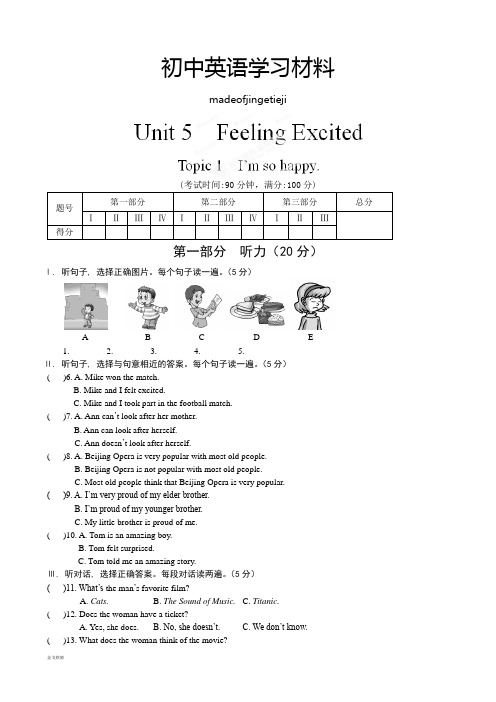
初中英语学习材料madeofjingetieji(考试时间:90分钟,满分:100分)第一部分第二部分第三部分总分题号ⅠⅡⅢⅣⅠⅡⅢⅣⅠⅡⅢ得分第一部分听力(20分)Ⅰ. 听句子, 选择正确图片。
每个句子读一遍。
(5分)A B C D E1. ____2. ____3. ____4. ____5. ____Ⅱ. 听句子, 选择与句意相近的答案。
每个句子读一遍。
(5分)( )6. A. Mike won the match.B. Mike and I felt excited.C. Mike and I took part in the football match.( )7. A. Ann can’t look after her mother.B. Ann can look after herself.C. Ann doesn’t look after herself.( )8. A. Beijing Opera is very popular with most old people.B. Beijing Opera is not popular with most old people.C. Most old people think that Beijing Opera is very popular.( )9. A. I’m very proud of my elder brother.B. I’m proud of my younger brother.C. My little brother is proud of me.( )10. A. Tom is an amazing boy.B. Tom felt surprised.C. Tom told me an amazing story.Ⅲ. 听对话, 选择正确答案。
每段对话读两遍。
(5分)( )11. What’s the man’s favorite film?A. Cats.B. The Sound of Music.C. Titanic.( )12. Does the woman have a ticket?A. Yes, she does.B. No, she doesn’t.C. We don’t know.( )13. What does the woman think of the movie?A. She doesn’t like it at all.B. She likes its music.C. She thinks it’s just so-so.( )14. What’s Tom’s plan for next week?A. He is going to Beijing.B. He will have to do housework at home.C. He has lots of work to do.( )15. How does Tom like Beijing Opera?A. Very funny and interesting.B. Boring.C. Moving.Ⅳ. 听对话, 选择正确答案。
仁爱版英语八年级下册Unit5Topic1Youlookexcited.第1课时听说课优秀教学案例

2.互动性强:在教学过程中,我注重运用多种互动活动,如游戏、角色扮演、小组讨论等,激发学生的学习兴趣,营造积极的学习氛围。这些互动活动不仅能够提高学生的参与度,还能够促进学生之间的交流与合作,增强学生的团队合作精神。
3.任务型教学:我采用任务型教学法,设计各种真实的交际情境,让学生在实践中运用英语,提高语言表达能力。通过完成不同的任务,学生能够更好地将所学知识运用到实际生活中,培养解决问题的能力。
4.设计问题反思,让学生思考如何更好地管理和表达自己的情绪,提高自我认知能力。
(三)小组合作
1.分组进行角色扮演,让学生在小组内练习情绪表达的对话,培养团队合作精神。
2.设计小组讨论活动,让学生分享自己的情绪体验,互相倾听和理解,培养沟通能力。
3.小组共同完成任务,如编写情绪故事,通过合作完成任务,提高解决问题的能力。
4.培养学生环保意识和责任感,通过学习英语,关注环境保护问题,积极参与环保活动。
三、教学策略
(一)情景创设
1.利用多媒体展示不同情绪的表情图片,让学生观察并猜测人物的情绪。
2.设计角色扮演活动,让学生模拟不同情绪下的对话,增强对情绪表达的理解和运用。
3.创设真实的生活情境,如在校园里的不同场景,让学生用英语描述自己的情绪和感受。
4.分组合作学习,培养学生的团队合作精神和沟通能力,提高解决问题的能力。
(三)情感态度与价值观
Unit 5What are the shirts made of 综合素质评价

Unit 5 综合素质评价限时:120 分钟满分:120 分第一部分听力(共四大题, 满分20分)Ⅰ. 短对话理解(共5小题; 每小题1分, 满分5分)()1. What does the man want?A. B. C.()2. What is China famous for?A. B. C.()3. Where does the conversation happen?A. In a school.B. In a bank.C. In a restaurant. ()4. How much does the man pay?A. 40 dollars.B. 60 dollars.C. 100 dollars. ()5. What is the coat made of?A. Cotton.B. Silk.C. Wool.Ⅱ. 长对话理解(共5小题; 每小题1分, 满分5分)听下面一段对话, 回答第6、7题。
()6. Why does the boy look unhappy?A. Because he has to write a paper.B. Because he has to take a history class.C. Because he has to repair his computer.()7. What's the most important invention for the girl?A. Clocks.B. Computers.C. Chocolate.听下面一段对话, 回答第8至10题。
()8. Whom does the woman buy Tang costumes for?A. Herself.B. Mr Zhang.C. Her parents.()9. When will the speakers meet?A. At 8: 30 a. m.B. At 9: 30 a. m.C. At 10: 30 a. m. ()10. Which of the following is true?A. Mr Zhang has no time to do his work.B. Tang costumes are usually made of silk.C. Mr Zhang loves Tang costumes very much.Ⅲ. 短文理解(共5小题; 每小题1分, 满分5分)()11. What are more and more popular today?A. Mobile phones.B. Paper cuttings.C. Sky lanterns. ()12. What can't people use mobile phones to do?A. Talk with friends.B. Go online.C. Cook meals. ()13. What are most mobile phones made of?A. Plastic or silver.B. Steel or silver.C. Iron or plastic. ()14. What's the attitude of the scientists towards mobile phones?A. Worried.B. Excited.C. Angry.()15. What is using mobile phones too often bad for?A. Eyes, necks and legs.B. Eyes, necks and personalities.C. Eyes, necks and feet.Ⅳ. 信息转换(共5小题; 每小题1分, 满分5分)第二部分英语知识运用(共两大题, 满分30分)Ⅴ. 单项填空(共10小题; 每小题1分, 满分10分)()21. —Look! My aunt's house has _____ own swimming pool and a big garden.—How big it is! I really love it.A. myB. itsC. hisD. their()22. —Excuse me. Could you tell me where the police station is?—Sorry, I'm not a________ person. You can ask a policeman.A. localB. specialC. foreignD. strange ()23. She is a(n)________ girl with patience. We all like her.A. livingB. aliveC. livelyD. live()24. —Mom, could I watch TV tonight?—Of course, if your homework ________.A. finishesB. finishedC. was finishedD. is finished ()25. —What________ do you think the cup is made of?—Glass, of course.A. productB. materialC. priceD. color()26. How terrible! The truck hit the wall to________ hurting the child.A. produceB. heatC. polishD. avoid()27. —Why are you late for work today?—Sorry, because the ____ was heavy. I spent about two hours driving here.A. lineB. roadC. situationD. traffic()28. —I heard that Mrs. White decided to talk to John's parents.—Oh, he is________ again. He had a fight with his classmate yesterday.A. in silenceB. in peaceC. in troubleD. in pain ()29. Water can________ ice when the temperature is low enough.A. get intoB. get upC. turn intoD. turn down ()30. [2023·马鞍山八中期中]—I love the Internet. I've come to know many friends on the Net.—________. Few of them would become your real friends.A. That's for sureB. I couldn't agree moreC. That's not the caseD. I'm pleased to know that3Ⅵ. 完形填空(共20小题; 每小题1分, 满分20分)AIn ancient times, the Four Great Inventions in China had a great influence on the whole world. In recent years, China once again has 31 its ability to change the world with its “four great new inventions”: high-speed railways, electronic payments, bike-sharing and online shopping.Do you know 32 the new inventions can appear in China? The “four great new inventions” are 33 related to China's high-tech innovation(创新). For example, the operating 34 of bike-sharing is based on the satellite navigation system, mobile payment, big data and other high technologies. This shows that China's high-tech innovation has greatly 35 the quality of people's lives.China has entered a new innovative era, thanks to the large amount of 36 that China has spent on encouraging innovation. China is beginning to 37 in innovation in some ways.“The ‘four great new inventions' have surely improved customer experience, and helped national and global(全球的)economy 38 at the same time,” said Charlie Dai, the principal analyst(首席分析师)of an American market research company.As a whole, all the Chinese are 39 of their four great new inventions. It is increasingly clear that China is innovating and no longer copying Western ideas. More and more foreigners 40 to promote(促进)economic development in their countries by learning from China's innovation.()31. A. seemed B. appeared C. looked D. showed ()32. A. when B. what C. why D. where()33. A. all B. both C. neither D. none()34. A. example B. model C. style D. kind()35. A. improved B. finished C. invented D. wasted ()36. A. people B. water C. electricity D. money()37. A. try B. lead C. win D. value()38. A. develop B. warn C. mean D. live()39. A. proud B. tired C. bored D. satisfied()40. A. afford B. repeat C. hope D. waitBDo you know that humans have been cleaning their teeth for over 7, 000 years? According to the BBC, the ancient Egyptians used a type of toothpaste(牙膏) 41 it is believed that the Egyptians used a finger 42 a toothbrush to clean their teeth. Chinese people may have 43 the first toothbrush around 1600 B. C.Your toothbrush, however, may have also become 44 . Because it is now possible to clean our teeth 45 using our hands!Two Canadians, Adel Elseri and Said Fayad, have invented 46 called T2T or “tongue-to-teeth”. Elseri says he came up with the idea 47 he was driving home after a long day at work. His 48 is a toothbrush that goes onto your tongue(舌). T2T has special edges(边缘) and toothpaste. So just 49 your tongue over your teeth and it cleans your teeth just like a toothbrush 50 ! It will make your breath fresh too.Elseri and Fayad made this hand-free toothbrush because they believed it was an easier way for someone to brush their teeth. But people can only use the T2T once. ()41. A. so B. then C. but D. or()42. A. instead of B. because of C. more than D. less than ()43. A. discovered B. invented C. built D. developed ()44. A. science B. history C. a problem D. a secret ()45. A. by B. from C. without D. for()46. A. nothing B. everything C. anything D. something ()47. A. until B. when C. since D. though ()48. A. idea B. story C. word D. plan()49. A. hold B. pull C. move D. check()50. A. is B. does C. was D. did第三部分阅读理解(共两大题, 满分45分)Ⅶ. 补全对话, 其中有两项多余(共5小题; 每小题1分, 满分5分)A: Hi, Wang Lei. How new and beautiful your car is!B: Thank you. 51. ________5A: 52. ________B: It was made in Shanghai.A: 53. ________B: Yes, you are right. But there are more and more cars in our city. 54. ________ A: Yes, environmental protection is becoming more and more important.B: I think we should use the car less and use the bike more.A: Yes. 55. __________Ⅷ. 阅读理解(共20小题; 每小题2分, 满分40分)A()56. What is the flying disk used for?A. Taking photos.B. Playing a game.C. Keeping the rain out.D. Having dinner.()57. Who invented the first camera?A. An Italian.B. A Chinese.C. A college student.D. A teacher.()58. Why is taking a trip by bike pleasant?A. Because it is very fast.B. Because it is very slow.C. Because it can keep the sun out.D. Because you can get close to nature.BAs a traditional and meaningful board game, Weiqi was invented in China more than 2, 500 years ago and it is still played until today.The playing pieces are called stones. One player uses the white stones and the other, black. The players take turns to play the stones on the game board. As we know, the board surface has 361 cross points. The stones are placed on them.Weiqi is also called Go in the world. Learning it can not only improve people's logical thinking ability, but it can also develop their calm character. That's why it is more and more popular with modern people.In the Sui and Tang Dynasties, Weiqi traveled to Japan, and then to Europe in the 19th century. Now it has grown into an international competition event. So far, people from over 40 countries have played it. Among them, players from China, Japan and South Korea have the highest level of Weiqi.On February 19, Chinese-English Dictionary of Weiqi Terms(术语)came out in7Beijing. It's the first professional dictionary about Weiqi in China. As a symbol of Chinese culture, Weiqi has its special language. It also has its own way of thinking and the method of communicating. The dictionary will serve as a necessary tool and bridge for spreading Weiqi culture.()59. When was Weiqi invented in China?A. About BC 800.B. About BC 480.C. About AD 480.D. About AD 500.()60. What does the underlined word “pieces” in Paragraph 2 mean in Chinese?A. 碎片B. 棋子C. 零件D. 条/块()61. According to the passage, Weiqi can improve people's ________.A. physical abilityB. language abilityC. logical thinking abilityD. writing ability()62. What is the best title of the passage?A. The History of WeiqiB. The Development of WeiqiC. An Introduction of WeiqiD. The Methods of Playing WeiqiCFan Shenghua is one of the inheritors(继承人)of WestLake Longjing tea roasting technique(炒茶技艺). He has beenmaking Longjing tea for more than forty years.Longjing tea leaves are famous for their color, taste and shape.“You have to touch the leaves with your hands to feel how much water is being removed(去除),” Fan said. “If too much is removed, the leaves will break into pieces; if not enough is removed, the tea will taste bitter(苦的).”This traditional technique dates back to the Ming and Qing dynasties. It not only makes the tea taste good, but has also become an important part of Chinese tea culture.These days, however, more people are usi ng machines to do the job. “It's easier, but the quality is not as good,” Fan said. “Machine-made tea floats longer in water and tastes bitter.”Fan is now teaching some young men. His son, a 27-year-old college graduate, isone of them. “It's a tradition.We need to pass it down,” he said.()63. According to Paragraph 3, what will happen to tea leaves if they have too much water?A. They will go bad quickly.B. They will break into pieces.C. They will lose their fresh taste.D. They will have a bitter taste.()64. What does the underlined part “This traditional technique” refer to?A. Picking tea leaves.B. Roasting tea leaves by hand.C. Drinking tea in a traditional way.D. Growing tea plants on the mountains.()65. What does Fan think of making tea by machine?A. It is easier than by hand.B. It has a long history in China.C. It makes tea taste better and better.D. It becomes an important part of tea culture.()66. What can we learn from the last paragraph?A. Fan's son studies tea culture in college.B. Fan will open his own tea house in China.C. Fan's son is learning the tea roasting technique.D. Fan is making this technique popular worldwide.DSara Du, a 16-year-old Chinese-American girl, started writing computer programs two years ago.She bought an 828-page book about creating apps and spent an hour or two every day learning to program. “It wasn't difficult, because it was fun,” Du said. “It was different from what I learned at school.”In January, Du was honored at a tech trade show(技术贸易展)in the United States for developing Bluejay, a smartphone app that helps to find missing people.9Rescuers(救援者)can fly a driverless(无人驾驶的)plane to look for those missing persons. The smartphone of a missing person can send signals to a chip(芯片)on the plane through Bluetooth.Du got the idea for Bluejay based on her own experience. One day in 2015, she had to wait alone in a quiet park in the evening because she couldn't get a wireless signal(无线信号). She stayed in the dark park, worrying about wild animals. It took more than two hours until her father showed up. “I was thinking, ‘After I get out, I'm going to solve this problem',” Du said. She then started the project and worked on it nearly every day for the next two months.()67. When did Sara Du start writing computer programs?A. At the age of 14.B. At the age of 16.C. At the age of 18.D. At the age of 20.()68. What is Bluejay used for?A. Helping find missing people.B. Enjoying music.C. Listening to the radio.D. Studying online.()69. Which of the following is true?A. In 2015, Sara had to wait in a park all by herself one evening.B. It was hard but fun for Sara to learn programming by herself.C. The driverless plane sends signals to the lost people through Bluetooth.D. One day in 2015, Sara went to a park to see wild animals and got lost.EDai Changlin has become well known for making little car models from waste cans(废金属罐) and other rubbish, turning the waste into profit-making(营利的) products. The man now i s a social media influencer who is called as “the king of transforming the rags” by followers. He has more than 270, 000 followers on Douyin, or Tik Tok, and 250, 000 on Kuaishou. The question that Dai often asks is, “Are you a rubbish collector?”Dai has collected empty cans ever since he started to make little car models in 2005, when he was a high school student. He made them and sent them to his friends. Toy cars then were seen as something luxurious, and they were too expensive forchildren of ordinary families to own.After graduating from high school in 2008, instead of going to college, Dai worked in Hangzhou, and then came back to his hometown, Luoyang in 2012. But he kept his interest in making little car models. He said he made money from making the handmade cars, and enjoyed the pleasure of making different things.To date, he has collected more than 30, 000 empty cans, and over 25% of them were made into toy cars. Now he can make nearly 10, 000 yuan in a month when the works sell well on the Internet.Next, he decides to set up a course on the Internet to teach more and more people how to turn garbage into useful things.()70. What is Dai Changlin known as?A. A volunteer.B. A rubbish collector.C. A model car maker.D. A car driver.()71. Dai Changlin has collected empty cans since he________.A. found a jobB. finished middle schoolC. started to make little car modelsD. began to make money()72. How many empty cans have been made into toy cars by Dai Changlin so far?A. About 2, 500.B. About 6, 000.C. About 7, 500.D. About 30, 000.阅读下面短文, 并用英语回答问题(请注意每小题的词数要求)FDo you know the two lovely mascots(吉祥物)of 2022 Beijing Winter Olympic Games? You may know the five “Fuwa” dolls from the 2008 Beijing Olympic Games. On September 17, the two lovely mascots first showed on TV. Now, let's see who they are.Look at the panda! It looks like an astronaut. It wears an ice shell and looks fat, so we call it “Bing Dwen Dwen”. White is the colour of ice and snow. “Bing Dwen Dwen” li kes ice sports very much and is good at them. That's why it is the mascot of 2022 Beijing Winter Olympic Games.11Do you think the red mascot looks like a lantern? The lantern's name is “Shuey Rhon Rhon”. When the Chinese New Year comes, people always make or buy red lanterns. Red is the colour of hope and good luck, so people think their dreams will come true in the new year. “Shuey Rhon Rhon” can give players hope and help them do well in the 2022 Beijing Winter Paralympic Games.Many people in different countries like the two mascots very much, and they show their love for them on the Internet.73. How many mascots are there in the 2022 Beijing Winter Olympic and ParalympicGames? (不超过5个词)__________________________________________________________________ 74. Why do people make or buy red lanterns when the Chinese New Year comes? (不超过10个词)__________________________________________________________________ 75. How do people show their love for the mascots? (不超过10个词)__________________________________________________________________第四部分写(共两大题, 满分25分)Ⅸ. 单词拼写(共5小题; 每小题1分, 满分5分)76. Linda had little money so she just bought a ring made of s (银)for hermother.77. An excellent teacher can make his class l (生动的)and keep hisstudents interested.78. Many classical Chinese poems are w (广泛地) spread in the world.79. Some people c (覆盖) their eyes with a piece of black cloth if theyfind it hard to sleep.80. There are still some green l (树叶) on the tree in autumn.Ⅹ. 书面表达(共1小题; 满分20分)皮影戏、京剧、剪纸、捏面人儿等都是中国古老的传统艺术。
- 1、下载文档前请自行甄别文档内容的完整性,平台不提供额外的编辑、内容补充、找答案等附加服务。
- 2、"仅部分预览"的文档,不可在线预览部分如存在完整性等问题,可反馈申请退款(可完整预览的文档不适用该条件!)。
- 3、如文档侵犯您的权益,请联系客服反馈,我们会尽快为您处理(人工客服工作时间:9:00-18:30)。
Unit 5 Topic 1 第一部分听力(20分)Ⅰ. 听句子,选择正确图片。
每个句子读一遍。
(5分)( )1. ( )2.A B C A B C( )3. ( )4A B C A B C( )5.A B CⅡ. 听句子,选择正确答语。
每个句子读一遍。
(5分)( )6. A. Oh, I’m not happy. B. The same to you. C. We are all happy.( )7. A. I have no free time. B. How about you? C. I often play basketball.( )8. A. No, I don’t. B. Yes, he does. C. No, I walk to school.( )9. A. Yes, it is. B. You’re right. C. Thank you.( )10. A. I like playing it very much. B. I want to play it very much.C. Three times a week. Ⅲ. 听对话,选择正确答案。
每段对话读两遍。
(5分)( )11. How does Michael usually come to school?A. By buB. By bike.C. On foot.( )12. What does the man often do on Sundays?A. He plays computer games.B. He plays basketball.C. He plays football.( )13. How often does Yu Ming go to the zoo?A. Every month.B. Every day.C. Every week.( )14. How does Miss Wang sometimes come to school?A. By bike. B. By bus. C. On foot.( )15. Where does Zhou Lina usually have lunch?A. In her office.B. At home.C. At school.Ⅳ.Ⅰ. 单项选择。
(10分)( )1. The Browns usually drive to the park on Sundays. But today they go to the park _____ foot. A. in B. on C. by D. of( )2. Bob often _____ his homework after dinner.A. do B. does C. doing D. to do( )3. The boy likes playing _____ basketball very much.A. a B. an C. the D. / ( )4.—_____ does Kangkang meet his friends?—Four times a month.A. How oftenB. How longC. WhenD. What time( )5.—What do you usually do _____ weekdays after school?—I usually read books.A. inB. atC. onD. for( )6. Mr. King sometimes _____ the subway home.A. takeB. taking C. takesD. to take( )7. —What does Fang Yan do in her free time?—She often _____ a movie.A. seesB. watchC. looksD. read( )8. —_____—The same to you.A. Good morning!B. Happy New Year!C. See you later.D. How do you do?( )9. Zhao Lin _____ to Beijing by train often. He usually goes by plane.A. isn’t goingB. doesn’t goC. not goD. don’t go( )10.—Your new dress looks very nice! —_____A. Yes, it is so nice.B. Where? Where?C. Thank you.D. That’s all right.Ⅱ. 情景交际。
(5分)根据对话的情景,从方框中选择适当的句子填在画线处,使对话完整通顺。
其中有两项是多余的。
A: Hi, Wang Li! What time do you usually get up?B: I always get up at about six o’clock.A: 11 How do you usually go to school?B: 12 But sometimes I go to school by bus.A: By the way, where does your mother work?B: She works in a factory. She makes shoes.A: 13 B: She usually goes to work by subway.A:Where does she have lunch?B: 14 It takes her too much time to come back home for lunch.11. 12. 13. 14. 15.Ⅲ. 完形填空。
(10分)On Sundays, Li Lei gets up at six thirty. He has 16 at eight. Then he helps his mother 17 the housework(家务劳动). At ten o’clock he leaves 18 and goes shopping 19 bike. At about eleven o’clock he comes 20 home.He likes 21 very much. He helps his mother with the cooking. They 22 lunch at twelve.In the afternoon he often 23 games with his friends. They have 24 at six thirty. In the evening he does his homework. Sometimes, he 25 TV. He goes to bed at nine.( )16. A. food B. breakfast C. lunch D. supper( )17. A. in B. on C. with D. from( )18. A. home B. house C. room D. classroom ( )19. A. by B. on C. in D. at( )20. A. for B. to C. back D. from( )21. A. cook B. cooking C. the cook D. the cooking ( )22. A. to have B. having C. have D. has( )23. A. plays B. is playing C. takes D. is taking ( )24. A. work B. homework C. housework D. dinner( )25. A. sees B. looks C. is watching D. watchesⅣ. 阅读理解。
(30分)(A) Hi, I’m Zhu Hua. I’m a junior high school student in Beijing. There are twenty-six boys and twenty-two girls in my class. Half of the students come to school by bike. Five boys and four girls come to school on foot. About a quarter of us come to school by bus. The others come to school by subway. We’re all from China. We’re good friends.根据短文内容,完成下面表格。
(B)Alice is my good friend. She is twenty-two years old. Now she lives in Beijing, China. She teaches English in a junior high school. She loves making friends with the students and they like her very much. Every morning she gets up very early. At about 7:00, she usually has a glass of milk and some bread for breakfast at home. Then she walks to work and gets to school at about a quarter to eight. At 12:00 she eats a hamburger and an apple for lunch. Her favorite drink is Coke. She goes home at 5 o’clock in the afternoon. She likes to have noodles(面条)and chicken for dinner. On Sunday, she often comes to see me. Sometimes we go to a Chinese restaurant to have lunch.根据短文内容,选择正确答案。
( )31. Alice is _______.A. a doctor B. a nurse C. a driver D. a teacher( )32. —What does Alice usually have for breakfast at home?—_______ A. A glass of milk and some bread. B. An egg and some bread.C. A cup of coffee and some bread.D. A glass of milk and a hamburger.( )33. Alice gets to school _______ a. m. A. at 8:15 B. at 7:45 C. at 7:40 D. at 8:00 ( )34. —What does Alice often do on Sunday?—She often ________. A. has dinner with me B. goes to the restaurantC. comes to see meD. eats noodles( )35. Which of the following is NOT true?A. Alice lives in China now.B. Alice likes Coke best.C.Alice gets home at 5:00 in the afternoon.D. On weekdays she has a hamburger and an apple for lunch.(C)()36. Li Huimin, Wan Junfeng and Chen Qiang all _____ in their free time.A. watch TVB. meet friendsC. cook foodD. play games()37. Chen Qiang doesn’t _____.A. meet friendsB. cook foodC. watch TVD. A and B()38. Li Huimin and Wang Junfeng _____ in their free time, but Chen Qiang doesn’t.A. go fishingB. watch TVC. meet friendsD. play computer games()39. Wang Junfeng does many things in his free time EXCEPT(除了) _____.A. watching TVB. cooking foodC. going fishingD. playing computer games()40. Which of the following is TRUE?A. Li Huimin and Wang Junfeng doesn’t play computer games.B. Chen Qiang cooks food.C. Wang Junfeng goes fishing.D. Chen Qiang and Wang Junfeng meet friends.Ⅰ. 词汇部分。
